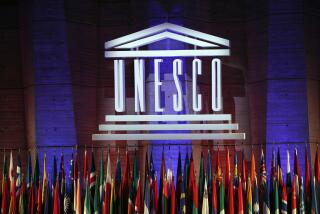Task Force Urges U.S. to Rejoin Controversial UNESCO : Policy: The recommendation is under review. U.S. would owe $65 million a year in dues.
WASHINGTON — A Clinton Administration task force has recommended that the United States revive its membership in UNESCO, a U.N. agency abandoned by former President Ronald Reagan to signal U.S. dissatisfaction with the world organization.
Assistant Secretary of State Douglas Bennet, who headed the task force, said in an interview Monday that the recommendation sets October, 1995, as the proposed date for rejoining.
Amid great fanfare and controversy, the United States withdrew from UNESCO (the U.N. Educational, Scientific and Cultural Organization) in 1984, an action that crippled the agency. The Reagan Administration was trying to send a message to the U.N. system that administrative waste and political antics would not be tolerated by the United States, which pays more dues to the United Nations and its agencies than any other country.
The recommendation to return to UNESCO reached the White House earlier this month, but there was no report on whether President Clinton intends to carry it out. A White House official said that the recommendation is under review by the National Security Council.
The American assessment of UNESCO’s annual budget--25%--would come to $65 million if the United States rejoined immediately. For that reason, according to a congressional source, the White House Office of Management and Budget persuaded the task force to recommend a delay until the fiscal year beginning in October, 1995.
As partial justification for the proposal to return to the Paris-based agency, Bennet said that UNESCO had abandoned its controversial political positions and had shaken off its questionable management practices.
During the debate that led to the U.S. withdrawal, Reagan Administration officials condemned UNESCO’s endorsement of a New World Information Order, a program sponsored by Third World and Communist governments to break a near-monopoly on news distribution enjoyed by a few American and West European news agencies. Many American newspaper executives denounced the UNESCO program as an assault on freedom of the press.
American officials also were infuriated by the style and practices of Amadou Mahtar M’Bow, a Senegalese who ruled UNESCO as director general for 12 years with a tyrannical and lavish hand. M’Bow, trying for a third term in 1987, lost to Federico Mayor of Spain.
Bennet, however, insisted that UNESCO’s abandonment of its past questionable practices was “not enough to justify going back.” More significantly, he said, the task force felt that UNESCO was involved in fields that the United States wanted to encourage.
A U.S. return would represent a personal triumph for Mayor, who has worked for five years to redirect the energies of the agency toward traditional cultural issues and to rid the agency of some of M’Bow’s vociferous lieutenants.
Any attempt to rejoin UNESCO could arouse opposition from conservative circles. But there is considerable support from educational and scientific organizations and from Congress members who consider themselves close supporters of the United Nations. California Rep. Esteban E. Torres (D-La Puente), who served as ambassador to UNESCO under President Jimmy Carter, introduced a House resolution in May urging Clinton to rejoin UNESCO this year; the measure has 22 co-sponsors.
Support for rejoining UNESCO also came from the American Federation of Teachers, the National Education Assn., the American Assn. for the Advancement of Science, the National Academy of Sciences and the American Chemical Society.
A United Nations Assn. panel, headed by former Sen. Robert T. Stafford (R-Vt.), also recommended a return.
More to Read
Sign up for Essential California
The most important California stories and recommendations in your inbox every morning.
You may occasionally receive promotional content from the Los Angeles Times.










